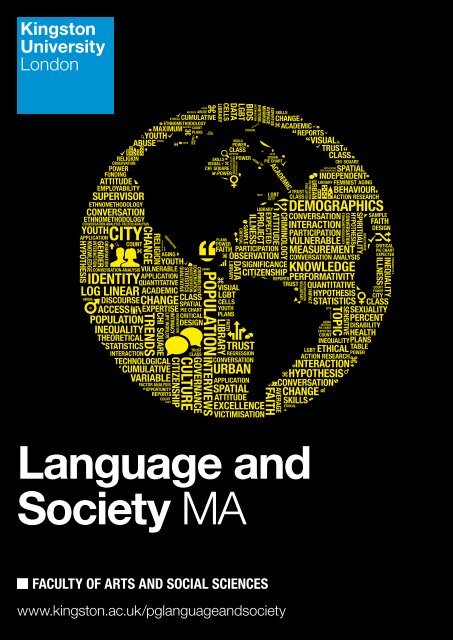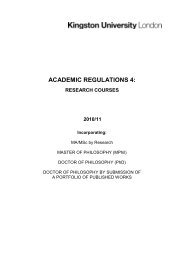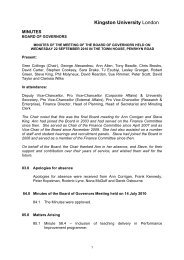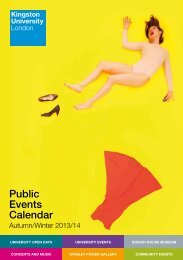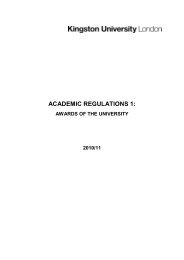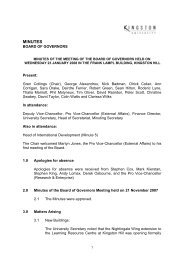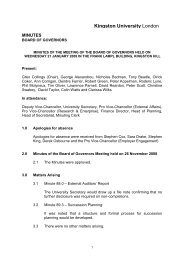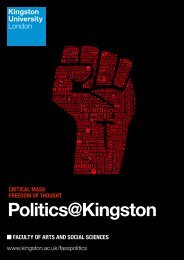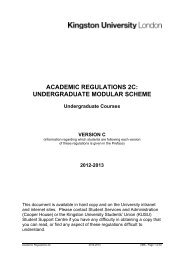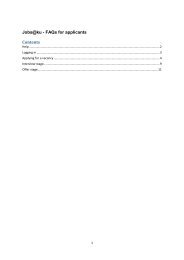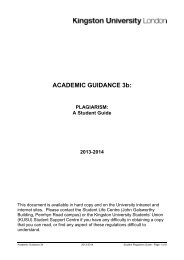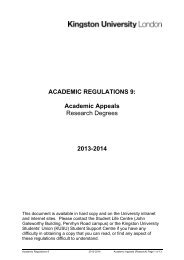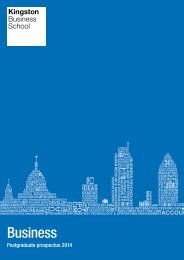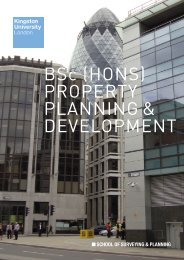Language and Society MA - Kingston University
Language and Society MA - Kingston University
Language and Society MA - Kingston University
Create successful ePaper yourself
Turn your PDF publications into a flip-book with our unique Google optimized e-Paper software.
<strong>Language</strong> <strong>and</strong><br />
<strong>Society</strong> <strong>MA</strong><br />
Faculty of Arts <strong>and</strong> Social Sciences<br />
www.kingston.ac.uk/pglanguage<strong>and</strong>society
<strong>Language</strong> <strong>and</strong> <strong>Society</strong> <strong>MA</strong><br />
About the course<br />
Course overview<br />
The <strong>MA</strong> <strong>Language</strong> <strong>and</strong> <strong>Society</strong> provides students with an advanced<br />
underst<strong>and</strong>ing of language use in society. The programme explores how aspects<br />
of everyday language relate to social categorisations, such as class, age, gender<br />
<strong>and</strong> ethnicity; it accounts for the linguistic diversity we encounter at all levels <strong>and</strong><br />
it displays a commitment to the pursuit of equality <strong>and</strong> social justice.<br />
The <strong>MA</strong> explores key principles, methods <strong>and</strong> theories in the interdisciplinary<br />
field of sociolinguistics <strong>and</strong> their application to a range of areas, including<br />
intercultural communication, language ideology <strong>and</strong> discourse, narrative,<br />
social interaction <strong>and</strong> identity, <strong>and</strong> meaning. The <strong>MA</strong> is unique in that it allows<br />
students to undertake original research within the area of language <strong>and</strong> society<br />
from a sociolinguistic or sociocultural perspective, combining their critical<br />
underst<strong>and</strong>ing of current theories <strong>and</strong> debates in the field with their reflection on<br />
their own experience as language user in a superdiverse society.<br />
The programme is designed for students who have completed a degree in<br />
English language, linguistics, sociology or a cognate subject area, as well as<br />
those who work in language-related professions (such as teachers, translators<br />
<strong>and</strong> language consultants). The <strong>MA</strong> programme provides an excellent foundation<br />
for students who wish to pursue their postgraduate studies to MPhil/PhD level.<br />
What you will study<br />
The <strong>MA</strong> is composed of a mix of core <strong>and</strong> option modules. Teaching typically<br />
takes place over two teaching blocks while the dissertation also takes place<br />
over the summer period. The first semester core module <strong>Language</strong> <strong>and</strong><br />
<strong>Society</strong>: Principles <strong>and</strong> Theory familiarises students with concepts, theories<br />
<strong>and</strong> methodologies central to an advanced study of language as a social<br />
phenomenon. The other core module, the Dissertation Project allows students<br />
to demonstrate their ability to undertake a sustained piece of independent<br />
research on any aspect of the relationship between language <strong>and</strong> society.<br />
In addition to the core modules there are a number of optional modules,<br />
including Special Studies which run over two teaching blocks. These<br />
modules encourage students to broaden <strong>and</strong> deepen their knowledge <strong>and</strong><br />
underst<strong>and</strong>ing of aspects of language <strong>and</strong> society <strong>and</strong> develop further their<br />
research skills with reference to the specific topics being taught. Topics<br />
you will explore include language variation <strong>and</strong> change, bi/multilingualism,<br />
st<strong>and</strong>ard <strong>and</strong> non-st<strong>and</strong>ard varieties (with specific reference to English), world<br />
Englishes, language <strong>and</strong> ethnicity, intercultural discourse <strong>and</strong> interaction,<br />
public, media <strong>and</strong> political discourses, digital communication, the pragmatics<br />
of communication, language <strong>and</strong> emotion, narrative, voice <strong>and</strong> identity.<br />
<strong>MA</strong> <strong>Language</strong> <strong>and</strong> <strong>Society</strong> students will also have the opportunity to study<br />
modules offered by related postgraduate programmes in the Faculty.<br />
Careers<br />
By the end of the programme, students will have developed solid theoretical<br />
knowledge in a range of theoretical traditions within sociolinguistics, as well<br />
as an advanced competence in qualitative research methods for the study of<br />
language <strong>and</strong> society. In addition, students will have gained a range of skills<br />
desirable to employers, such as strong communication <strong>and</strong> presentation skills,<br />
critical thinking skills, self-management, meticulousness in writing <strong>and</strong> editing<br />
work, the ability to reflect on one’s own work, the ability to write for particular<br />
purposes <strong>and</strong> audiences, <strong>and</strong> the ability to work constructively with others.<br />
Graduates from this course can pursue any of the following career paths:<br />
• <strong>Language</strong> teaching, including EFL<br />
• Publishing <strong>and</strong> editing<br />
• Journalism<br />
• Social work<br />
• <strong>Language</strong> policy <strong>and</strong> planning (including education)<br />
• Advertising <strong>and</strong> marketing<br />
• Arts management<br />
• New media <strong>and</strong> communications<br />
For those interested in further research, the course provides an excellent<br />
foundation for MPhil/PhD-level study in related fields.<br />
Support<br />
In addition to structured teaching, guidance <strong>and</strong> support is available throughout<br />
the year through the provision of specific pre-set office hours, where you<br />
can meet <strong>and</strong> discuss your work with members of the teaching staff. Further<br />
academic support is provided by the Faculty’s Centre for Academic Skills <strong>and</strong><br />
Employability (CASE). You will also be allocated a personal tutor who acts as a<br />
regular point of contact to address any academic or pastoral issues that arise.<br />
Special features<br />
<strong>Language</strong> <strong>and</strong> <strong>Society</strong> <strong>MA</strong> offers:<br />
• interdisciplinary study of topics within <strong>and</strong> across the fields of linguistics<br />
<strong>and</strong> applied linguistics, sociolinguistics, pragmatics, philosophy,<br />
sociology, anthropology, (new) media <strong>and</strong> communication;<br />
• practice in researching aspects of language in society, with a<br />
specialisation in ethnographic <strong>and</strong> qualitative research methods;<br />
• an opportunity to critically engage with current theories in the field of<br />
sociolinguistics as well as debates in public domains ;<br />
• a mix of core <strong>and</strong> option modules to broaden <strong>and</strong> develop specific areas<br />
of expertise within the subfield of language <strong>and</strong> society;<br />
• a personal tutor scheme to support <strong>and</strong> guide students throughout their<br />
time on the programme by monitoring their progress <strong>and</strong> helping to<br />
identify individual needs;<br />
• employability skills embedded <strong>and</strong> interwoven throughout the curriculum<br />
to develop a set of achievements – skills, underst<strong>and</strong>ings <strong>and</strong> personal<br />
attributes desirable to an employer <strong>and</strong> allowing students to form a<br />
clearer idea of future career possibilities <strong>and</strong> aspirations; <strong>and</strong><br />
• the opportunity for students to draw <strong>and</strong> reflect on their own experiences<br />
as a language user in an increasingly superdiverse society.
www.kingston.ac.uk/pglanguage<strong>and</strong>society<br />
Course content<br />
Modules<br />
Please note that this list of modules is indicative <strong>and</strong> not intended to be definitive.<br />
Core modules<br />
<strong>Language</strong> <strong>and</strong> <strong>Society</strong>: Principles <strong>and</strong> Theory has two main aims: the<br />
first is to (re)familiarise you with terms <strong>and</strong> concepts central to the advanced<br />
study of language as a social phenomenon; the second is to explore the key<br />
research methodologies employed to study the complex relationship between<br />
language <strong>and</strong> society, with particular emphasis on qualitative research.<br />
<strong>Language</strong> <strong>and</strong> <strong>Society</strong> Dissertation Research Project is designed to<br />
allow you to demonstrate your ability to undertake a sustained piece of<br />
original, independent research on a range of topics <strong>and</strong> key issues related to<br />
the study of language <strong>and</strong> society.<br />
Option modules<br />
<strong>Language</strong>, Ethnicity <strong>and</strong> Identity explores the role of language in the<br />
construction of ethnic identity in context. This role is manifest both at a group<br />
level, where language often functions as the emblem of a community, <strong>and</strong> at<br />
an individual level, where language constitutes a powerful tool in displaying<br />
<strong>and</strong> negotiating an ethnic self. You will engage with issues <strong>and</strong> topics in<br />
this area <strong>and</strong> be expected to draw on your own experience, whether as bi/<br />
multilingual speaker who can code-switch <strong>and</strong> code-mix or as a monolingual<br />
speaker in a multilingual society.<br />
Discourse, Power <strong>and</strong> Inequality examines issues of discourse, power <strong>and</strong><br />
inequality following critical perspectives that have emerged from the study of<br />
discourse in social life <strong>and</strong> the study of talk in interaction. It looks at the way<br />
differential power relations manifest themselves in language <strong>and</strong> discourse<br />
<strong>and</strong> their implications for the production <strong>and</strong> reproduction of social inequalities<br />
based on one’s cultural background or social positionality.<br />
Principles of Intercultural Communication will familiarise you with<br />
cultural <strong>and</strong> linguistic theories useful for the systematic study of intercultural<br />
encounters in global <strong>and</strong> local contexts <strong>and</strong> engage with topics such<br />
as: intercultural interactions, advertising across cultures, intercultural<br />
communication in literature, as well as concepts such as essentialism,<br />
otherisation, stereotyping <strong>and</strong> language <strong>and</strong> culture shock.<br />
Political Communication, Advocacy <strong>and</strong> Campaigning explores the<br />
dynamic relationship between media, public opinion <strong>and</strong> public policy. You<br />
will examine different ways of making sense of the relationship between the<br />
state, the public <strong>and</strong> the media; different approaches to struggles over policy;<br />
<strong>and</strong> different ways to assess what influence media <strong>and</strong> policymakers have<br />
on each other. You will then go on to explore struggles over how politics <strong>and</strong><br />
policies are communicated.<br />
<strong>Language</strong> description, materials <strong>and</strong> methods describes the nature<br />
of language <strong>and</strong>, in particular, explores how the systems of grammar, lexis,<br />
phonology <strong>and</strong> discourse underlie language. You will be given the opportunity<br />
to write your own materials <strong>and</strong> so underst<strong>and</strong> the processes, production<br />
<strong>and</strong> adaptation of materials to language learning contexts. This module also<br />
provides an overarching perspective on how materials relate to language<br />
learning, syllabus design, teaching approaches <strong>and</strong> research. A unique feature<br />
of this module is that it is coupled with micro-teaching <strong>and</strong> class observations.<br />
Special Study: Narrative looks at narrative storytelling in both fictional <strong>and</strong><br />
real life stories. You will explore concepts within narratology to underst<strong>and</strong> the<br />
nature, form <strong>and</strong> function of narratives. You will also look at the common or<br />
universal characteristics of narrative storytelling as well as differences <strong>and</strong> find<br />
out how it is that we are able to comprehend, memorise <strong>and</strong> produce stories.<br />
Topics include narrative structure, characterisation, narration <strong>and</strong> disnarration,<br />
narrative beginnings, the narrator as witness, children’s narratives <strong>and</strong><br />
fairytales, <strong>and</strong> narratives in the media (eg newspapers, blogs) such as those<br />
following major world events.<br />
Special Study: <strong>Language</strong> <strong>and</strong> Emotion examines emotional expression,<br />
communication <strong>and</strong> performance in <strong>and</strong> through language, drawing on<br />
concepts <strong>and</strong> frameworks from linguistic anthropology, sociocultural<br />
linguistics <strong>and</strong> sociolinguistics. You will consider how representations of<br />
emotion in literature, film, the media <strong>and</strong> advertising, <strong>and</strong> everyday discourses<br />
shape structures of feeling, <strong>and</strong> will conduct in-depth studies of emotion as<br />
manifest in situated linguistic <strong>and</strong> sociocultural activities.<br />
Special Study: Meaning considers work in the philosophy of language on<br />
what it means to ‘mean’ something <strong>and</strong> work in the domain of pragmatics<br />
<strong>and</strong> linguistic semantics that suggest a distinction between the contextdependent<br />
meaning inherent in language-in-use <strong>and</strong> context-independent<br />
meaning. You will study how different linguistic elements interact with the<br />
discourse context to contribute to the communicative act, <strong>and</strong> also consider<br />
the role played by extra-linguistic aspects of communication such as facial<br />
expression, gesture <strong>and</strong> body language.<br />
(Special Study options will run subject to student numbers.)<br />
Research areas<br />
The <strong>MA</strong> in <strong>Language</strong> <strong>and</strong> <strong>Society</strong> is unique in its structure, which is designed<br />
to provide you with a grounding in <strong>and</strong> familiarity with a range of different<br />
research traditions, <strong>and</strong> then lead you to the systematic exploration of one or<br />
more domains of research:<br />
• The sociolinguistic domain – drawing on variationist <strong>and</strong>interactional<br />
approaches to sociolinguistics, with a primary focus on language varieties<br />
<strong>and</strong> discourses, ethnicity <strong>and</strong> identity, power <strong>and</strong> inequality<br />
• The sociocultural domain – informed by cultural <strong>and</strong> anthropological<br />
perspectives of the study of language, exploring, amongst others, the<br />
performance of language, intercultural communication <strong>and</strong> new literacies<br />
Student feedback<br />
“The overall curriculum of the <strong>MA</strong> programme is interesting <strong>and</strong> relevant to<br />
society at large. Students taking such a variety of modules in a structured<br />
programme should emerge with enhanced insights into the role of language in<br />
society <strong>and</strong> to the individual, <strong>and</strong> an ability to reflect critically on how particular<br />
uses of language are positioning individuals <strong>and</strong> groups.” (February, 2013)<br />
Special Study: Discourse <strong>and</strong> Social Media explores discourse aspects<br />
of social media in a globalising world, drawing on theories <strong>and</strong> methodologies<br />
developed in linguistics, sociolinguistics, <strong>and</strong> linguistic anthropology. You will<br />
have the opportunity to research language <strong>and</strong> communication in a range<br />
of social media, including social networking sites such as Facebook, media<br />
sharing sites like YouTube <strong>and</strong> Flickr, wikis, <strong>and</strong> other sites of (micro)blogging<br />
such as Twitter.
www.kingston.ac.uk/pglanguage<strong>and</strong>society<br />
<strong>Language</strong> <strong>and</strong> <strong>Society</strong> <strong>MA</strong><br />
Entry requirements<br />
We normally expect applicants to have a good second-class degree or above<br />
in English language, linguistics, or cognate subject areas. We will consider<br />
non-st<strong>and</strong>ard entrants on an individual basis.<br />
Interviews<br />
We normally invite applicants for an interview with the course director or<br />
another senior member of the teaching team. International students based<br />
overseas can arrange for an interview by email or telephone.<br />
Prior learning – AP(E)L<br />
Applicants with prior qualifications <strong>and</strong> learning will be considered on an<br />
individual basis.<br />
International students<br />
All non-UK applicants must meet our English language requirements. For<br />
this course it is a minimum of IELTS of 6.5 overall, with special conditions for<br />
students who require a Tier-4 student visa. Please make sure you read our<br />
full guidance about English language requirements on the course webpage,<br />
which includes details of other qualifications we’ll consider.<br />
Duration<br />
1 year full time, 2 years part time<br />
Attendance/delivery<br />
The study commitment may include evening, weekend or day-release<br />
sessions, <strong>and</strong> can vary in each teaching block. Timetables are subject to<br />
change. Please contact the postgraduate admissions office for further details.<br />
Assessment<br />
Continuous assessments in individual modules are carried out using a range<br />
of formats, including essays, presentations, practical projects <strong>and</strong> exams,<br />
plus assessment of final dissertation.w<br />
Location<br />
Located beside the River Thames, <strong>Kingston</strong> <strong>University</strong> is within the<br />
London travel-pass zone. Easily accessible from surrounding areas such<br />
as Surrey <strong>and</strong> Middlesex, its local train stations (<strong>Kingston</strong>; Surbiton) are<br />
also only 25 minutes from London Waterloo.<br />
Further information<br />
Contact details<br />
Please contact the Faculty’s Admissions Office with any further queries.<br />
Admissions Office (Postgraduate Courses)<br />
Faculty of Arts <strong>and</strong> Social Sciences<br />
<strong>Kingston</strong> <strong>University</strong><br />
Penrhyn Road<br />
<strong>Kingston</strong> upon Thames<br />
Surrey KT1 2EE<br />
T: +44 (0)20 8417 2361/2378<br />
F: +44 (0)20 8417 2292<br />
E: fasspostgrad-info@kingston.ac.uk<br />
www.kingston.ac.uk/pglanguage<strong>and</strong>society<br />
HS(13.390)L


